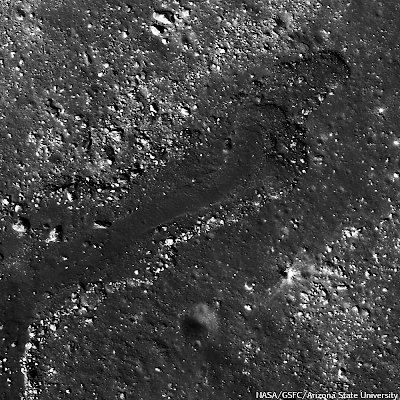Spectacular rubbley impact melt, flowing away from its parent crater. Across the widest part of the terminal lobe, the flow is ~115 meters. LROC Narrow Angle Camera (NAC) observation M153863408R, LRO orbit 7809, March 4, 2011; image field of view is 500 meters. See the full-size LROC Featured Image HERE [NASA/GSFC/Arizona State University].
 Lillian Ostrach
Lillian OstrachLROC News System
Yesterday's Featured Image highlighted boulders eroding out of a hill in the Anaxagoras crater impact melt pond. The opening image above highlights an impact melt flow located on the lunar far side at 23.99°N, 209.94°E.
The impact melt flowed from its source crater through rubbley ejecta before it cooled. There are several lobes at the terminus of the flow; perhaps these lobes "broke out" when the surface of the flow cooled but the interior of the flow remained hot and could still flow. The farthest-reaching lobe extends for about 95 m past the large lobe. There are some small boulders, around 10 meters across, that are entrained in the impact melt, but most of blocks close by seem pushed or maneuvered there by the flow, much like a levee formed during a volcanic flow.
The impact melt flowed from its source crater through rubbley ejecta before it cooled. There are several lobes at the terminus of the flow; perhaps these lobes "broke out" when the surface of the flow cooled but the interior of the flow remained hot and could still flow. The farthest-reaching lobe extends for about 95 m past the large lobe. There are some small boulders, around 10 meters across, that are entrained in the impact melt, but most of blocks close by seem pushed or maneuvered there by the flow, much like a levee formed during a volcanic flow.
Simulated perspective of the flow, looking west [LROC NAC M153863408LE - NASA/GSFC/Arizona State University].
LROC Wide Angle Camera (WAC) monochrome mosaic context view of the impact melt flow. Asterisk notes the flow, which is located in a relatively typical far side highland area (lots of large, old craters, few large fresh craters, and no mare) See the full-size WAC context image HERE [NASA/GSFC/Arizona State University].
How much of the flow do you observe in the full LROC NAC image, and can you trace its path across the image?
Relatively fresh flow of impact melt from its parent crater in this crop of the 2.5 km-wide full-width LROC Narrow Angle Camera observation [NASA/GSFC/Arizona State University].
Related Posts:
Out of the Shadows: Impact Melt at Byrgius A
Forked Impact Melt Flows at Farside Crater
Impact Melt Flows on Giordano Bruno
Epigenes A





No comments:
Post a Comment